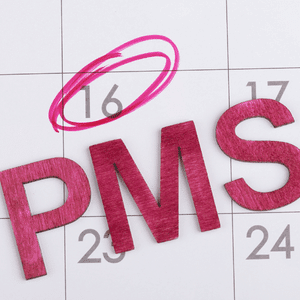If you suffer from PMS or Menopause / Hormone Fluctuations – Read on!
 From puberty through menopause, women experience a monthly cycle that involves fluctuating hormones, time of fertility, and periods of menstrual flow. For some women these natural cycles go rather smoothly, bot for about 75% of Western women, there is some level of discomfort during their monthly cycle. These health disturbances, which include both physical and emotional symptoms, typically start about 7-10 days before the start of menstruation.
From puberty through menopause, women experience a monthly cycle that involves fluctuating hormones, time of fertility, and periods of menstrual flow. For some women these natural cycles go rather smoothly, bot for about 75% of Western women, there is some level of discomfort during their monthly cycle. These health disturbances, which include both physical and emotional symptoms, typically start about 7-10 days before the start of menstruation.
PMS Symptoms
Although the symptoms vary from woman to woman, they typically include cramps, headaches, backaches, bloating, edema, food cravings, irritability, moodiness and/or depression. There may also be problems with constipation or diarrhea, reduced tolerance for light and noise, sleep disturbances, fatigue, anxiety, difficulty with concentration, and loss of interest in sex.
These symptoms have been lumped together under the term premenstrual syndrome or PMS for short. About 5% of women experience symptoms so severe that they interfere with their ability to function normally. Medicine has coined a new term for these women, premenstrual dysphoric disorder (PMDD). Whatever you label the problem modern medicine only offers symptomatic relief for PMS or PMDD symptoms.
This does not mean that there are no solutions. There are. In many cultures, the majority of women do not experience PMS. This suggests that dietary and lifestyle factors common to most western women are causing some of this discomfort during the monthly cycle.
So in this issue of Sunshine Sharing, we are exploring the underlying causes of PMS and PMDD and how to help you eliminate these problems with lifestyle, diet, and supplements.
Natural Remedies for PMS
Lifestyle habits and areas to focus on to assist during this time.
Support your liver and make sure it is not overburdened with toxins.
Improve your diet by eating foods that support a healthy body and liver. These foods include focusing and focus on avoiding xenoestrogens berries, leafy greens, organic meats, and eliminating processed foods and sugary foods. Take advantage of our 13 Week Program to help keep you focused.
You should also try to avoid environmental chemicals that mimic the action of estrogen. They are usually found in pesticides, agriculture chemicals, hormones fed to animals, plastic, and some cosmetic products.
Try adding some basic supplements to your routine including magnesium which helps with muscle tension, stress, and liver detoxification.
Vitamin B6 is an important hormonal and neurotransmitter.
This issue is full of information on the types of PMS and PMDD and is very informative. I have also found Seed Rotation for Balancing Hormones very helpful. For those of you looking to Rekindle your Romance make sure to check out this Sunshine Sharing Newsletter.
